|
|
|
Sort Order |
|
|
|
Items / Page
|
|
|
|
|
|
|
| Srl | Item |
| 1 |
ID:
138947


|
|
|
|
|
| Summary/Abstract |
Russia, the United Kingdom and the United States extended security assurances to Ukraine in December 1994 in an agreement that became known as the Budapest Memorandum. This agreement was part of a package of arrangements whereby Ukraine transferred the Soviet-made nuclear weapons on its territory to Russia and acceded to the Treaty on the Non-Proliferation of Nuclear Weapons (NPT) as a non-nuclear weapon state (NNWS). Russia's violations of the Budapest Memorandum, notably its annexation of Crimea, could have far-reaching implications for nuclear non-proliferation and disarmament because of the questions that Russia's behaviour has raised about the reliability of major-power security assurances for NNWS parties to the NPT. Doubts about the reliability of such assurances could create incentives to initiate, retain or accelerate national nuclear weapons programs. Moreover, because the Budapest Memorandum included restatements of UN Charter provisions and principles articulated in the Helsinki Final Act of the Conference on Security and Co-operation in Europe, Russia's disregard for the Budapest Memorandum has raised fundamental questions about the future of international order. The Russians have demonstrated that, despite economic sanctions and international condemnation, they are prepared to disregard longstanding legal and political norms, including those expressed in the Budapest Memorandum, in pursuit of strategic and economic advantages and the fulfilment of national identity goals. Unless Russia reverses its dangerous course, the fate of the Budapest Memorandum may in retrospect stand out as a landmark in the breakdown of international order.
|
|
|
|
|
|
|
|
|
|
|
|
|
|
|
|
| 2 |
ID:
138949
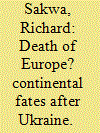

|
|
|
|
|
| Summary/Abstract |
The unravelling of the post-Cold War security order in Europe was both cause and consequence of the crisis in Ukraine. The crisis was a symptom of the three-fold failure to achieve the aspirations to create a ‘Europe whole and free’ enunciated by the Charter of Paris in 1990, the drift in the European Union's behaviour from normative to geopolitical concerns, and the failure to institutionalize some form of pan-continental unity. The structural failure to create a framework for normative and geopolitical pluralism on the continent meant that Russia was excluded from the new European order. No mode of reconciliation was found between the Brussels-centred wider Europe and various ideas for greater European continental unification. Russia's relations with the EU became increasingly tense in the context of the Eastern Partnership and the Association Agreement with Ukraine. The EU and the Atlantic alliance moved towards a more hermetic and universal form of Atlanticism. Although there remain profound differences between the EU and its trans-Atlantic partner and tensions between member states, the new Atlanticism threatens to subvert the EU's own normative principles. At the same time, Russia moved from a relatively complaisant approach to Atlanticism towards a more critical neo-revisionism, although it does not challenge the legal or normative intellectual foundations of international order. This raises the question of whether we can speak of the ‘death of Europe’ as a project intended to transcend the logic of conflict on the continent.
|
|
|
|
|
|
|
|
|
|
|
|
|
|
|
|
| 3 |
ID:
138944
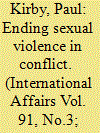

|
|
|
|
|
| Summary/Abstract |
During the past year, the UK Government has become the lead advocate for a perhaps surprising foreign policy goal: ending sexual violence in conflict. The participation of government representatives from more than 120 countries in a London Summit in June 2014 was the clearest manifestation of this project. This article offers an early assessment of the Preventing Sexual Violence Initiative (PSVI) and situates it within the history of global action against sexual and gender-based violence from UN Security Council Resolution 1325 onwards, with a particular focus on three key developments. First, the PSVI has embraced the already common understanding of rape as a ‘weapon of war’, and has stressed the importance of military training and accountability. This has exposed the tensions within global policy between a focus on all forms of sexual violence (including intimate partner violence in and out of conflict situations) on the one hand, and war zone activities on the other. Second, the Initiative has placed great emphasis on ending impunity, which implicates it in ongoing debates about the role of international and local justice as an effective response to atrocity. Third, men and boys have been foregrounded as ignored victims of sexual and gender-based violence. The PSVI has been crucial to that recognition, but faces significant challenges in operationalizing its commitment and in avoiding damage to existing programmes to end violence against women and girls. The success of the Initiative will depend on its ability to navigate these challenges in multiple arenas of global politics.
|
|
|
|
|
|
|
|
|
|
|
|
|
|
|
|
| 4 |
ID:
138948
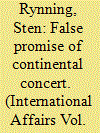

|
|
|
|
|
| Summary/Abstract |
The war in Ukraine is revelatory of a malaise in Europe's security order created by Russia's resistance to western institutions on the one hand and the western desire to maintain these institutions while partnering with Russia on the other. Absent a sense of priorities, western policy risks contributing to the erosion of Europe's security order that Russia seeks in opposition to western ambition. Europe's order is premised first and foremost on a distinctively western concert of nations—whereby Euro-Atlantic states coordinate policy according to a common purpose layered into both NATO and the EU—that forms part of a wider balance of power between Russia and the West. Western policy should aim to strengthen the concert and clarify the balance. However, the prevalent desire to include Russia in the concert confuses matters in a major way, eroding both the underlying sense of priorities and the foundation for order. This article examines this threatening erosion and traces it to three underlying trends: political contestation with regard to the meaning of ‘restoration’ post-1989; military instability following from the unpredictability of ‘hybrid war’; and moral equivocation on the part of the West when it comes to defending the Euro-Atlantic security order. The article concludes that given the depth of contestation, western allies should learn to distinguish concert from balance and act on the condition that the former, a vibrant western concert, is a precondition for the latter, a manageable continental balance.
|
|
|
|
|
|
|
|
|
|
|
|
|
|
|
|
| 5 |
ID:
138951
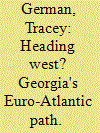

|
|
|
|
|
| Summary/Abstract |
Events in Ukraine in 2014 are likely to transform the presence and role of western institutions such as NATO in the post-Soviet area. The crisis has starkly revealed the limits of their influence within Russia's ‘zone of privileged interest’, as well as the lack of internal unity within these organizations vis-à-vis relations with Moscow and future engagement with the area. This will have long-term implications for the South Caucasus state of Georgia, whose desire for integration into the Euro-Atlantic community remains a key priority for its foreign and security policy-makers. This article examines the main motivators behind Georgia's Euro-Atlantic path and its foreign policy stance, which has remained unchanged for over a decade despite intense pressure from Russia. It focuses on two aspects of Georgia's desire for integration with European and Euro-Atlantic structures: its desire for security and the belief that only a western alignment can guarantee its future development, and the notion of Georgia's ‘European’ identity. The notion of ‘returning’ to Europe and the West has become a common theme in Georgian political and popular discourse, reflecting the belief of many in the country that they are ‘European’. This article explores this national strategic narrative and argues that the prevailing belief in a European identity facilitates, rather than supersedes, the central role of national interests in Georgian foreign policy.
|
|
|
|
|
|
|
|
|
|
|
|
|
|
|
|
| 6 |
ID:
138945


|
|
|
|
|
| Summary/Abstract |
President Barack Obama explained his historic reversal of half a century of US antagonism towards Cuba as necessary because of the failure of the policy of hostility pursued by his ten predecessors. But the old policy's failure was not new, and thus was not, in itself, an adequate explanation for the dramatic shift. This article uses theories of agenda-setting, policy failure and policy change to explain the persistence of the US policy of hostility from 1959 to 2014 and the policy change announced by President Barack Obama in December 2014. Four structural factors account for the continuity in policy and, as a result of gradual changes in those factors, the eventual policy shift. They are: the security threat Cuba posed to the United States during the Cold War; the political influence of the Cuban American community; the diplomatic cost to Washington, especially in Latin America, of maintaining the status quo; and domestic changes under way in Cuba.
|
|
|
|
|
|
|
|
|
|
|
|
|
|
|
|
| 7 |
ID:
138950
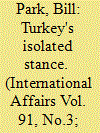

|
|
|
|
|
| Summary/Abstract |
This article explores the policy choices and political stances that lie behind Turkey's growing isolation both from its western allies and its regional neighbours. It details Ankara's approach to a range of current issues in its region—particularly relating to Syria but also Iraq, Libya, Iran, Russia and Israel—and seeks to trace these approaches back to the world-view of the country's ruling party and its leading figures, most notably President Erdogan and Prime Minister Davutoglu. It also assesses Turkey's reactions to the complex regional circumstances that have confronted Turkey in recent years. It considers the content and impact of some of the rhetoric emanating from Ankara, especially where it is directed towards the West. The article asks whether and why Turkish foreign policy has acquired an anti-western tone, and also looks at the extent to which its dealings with its neighbours can be explained by sectarian considerations or by pro-Muslim Brotherhood leanings. It then goes on to speculate about Turkey's future relationship with NATO and to a lesser degree the EU. It considers the prospects for an improvement in Ankara's relationship with its western allies, or whether Turkey–US relations in particular are now likely to be characterized by ‘strategic drift’ and a more transactional and contingent approach to alliance relationships.
|
|
|
|
|
|
|
|
|
|
|
|
|
|
|
|
| 8 |
ID:
138946


|
|
|
|
|
| Summary/Abstract |
Diplomatic assurances are promises which purport to manage the tension between the need for national security and the human rights obligations not to send individuals to countries where they would be at risk of torture. This article looks at how and why diplomatic assurances have become a part of policy efforts to make counterterrorism human rights compliant and as part of a wider strategy for drawing a line under the damaging legacy of the ‘war on terror’. This positive gloss on the use of diplomatic assurances is, however, in contrast to the worries motivating human rights advocates which centre on the implications for the global anti-torture regime. Behind the doubts surrounding diplomatic assurances is a wider concern, centred on whether the past architects of the war on terror can be trusted to progressively develop the rules and norms governing this domain.
|
|
|
|
|
|
|
|
|
|
|
|
|
|
|
|
|
|
|
|
|